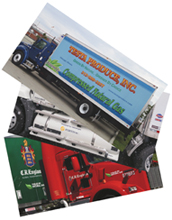Testa operates 45 other trucks and hopes to change them all over to natural gas. “As trucks come off lease, we hope to get another 10 this year, and they will all be CNG. No more diesel,” he comments. The company also has 10 hybrid cars.
Cold Star Freight Systems, Inc. on Vancouver Island in British Columbia recently purchased 10 CNG class 8 Mack tractors, using an incentive from utility company FortisBC, which covered 75 percent of the cost differential, says Kelly Hawes, Cold Star’s president. The trucks get fuel at a nearby FortisBC station.
“If all goes well, we’re planning to add another 10 natural gas trucks in 2015.” Hawes believes natural gas is here to stay and trucking firms that can make it work will be much more competitive in the industry.
Cold Star has a total of 37 vehicles, but because CNG is not readily available near an outlying facility, the company will never be able to transition to solely natural gas vehicles.
C.R. England, Inc., one of the nation’s biggest transportation companies, recently signed an LNG fuel agreement with Shell and has added 10 LNG Mackday-cab tractors in Southern California.
This is an expansion from the five LNG trucks the company started with in 2011, and two CNG trucks added last year in Utah. The fueling station is part of a nearby truck stop in Ontario, CA. The new CNG trucks were purchased through a grant from Utah’s Department of Environmental Quality, while the LNG vehicles were acquired without such incentives.
“We thought it was important to be aggressive with natural gas, because we think it has a bright future,” England says. The company paid a significant upcharge for the LNG equipment, and despite payback being a question mark, England believes “the experience has been invaluable.”
There have also been challenges with fueling stations and unfamiliarity of new equipment, but the company has not been deterred from moving forward.
“We are absolutely optimistic about the future,” England confirms. “The benefits of LNG include the range, because of the weight (fuel tanks are lighter than CNG) and the time to fuel is about half as long as it takes for CNG. Advantages to CNG include the price of fuel, which is about $1 per diesel gallonequivalent less, and simplified servicing.” And diesel trucks carry mandated emissions equipment that natural gas vehicles don’t require.
Transporters also recognize the public relations benefits of running natural gas trucks. “This is a big deal for our customers,” England notes.



